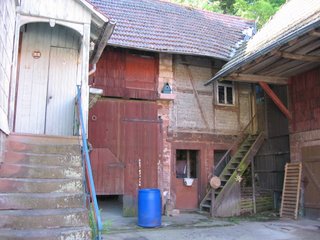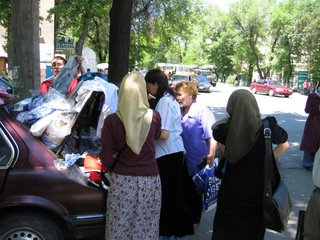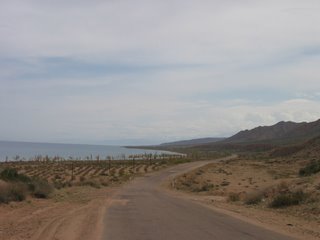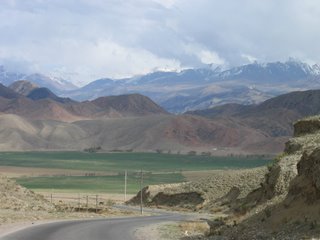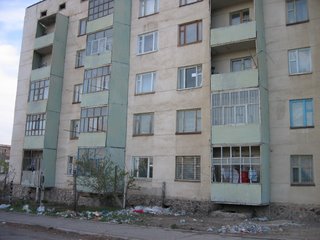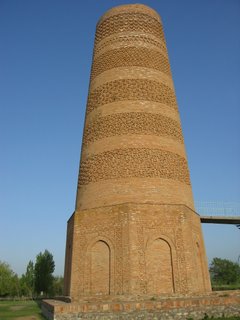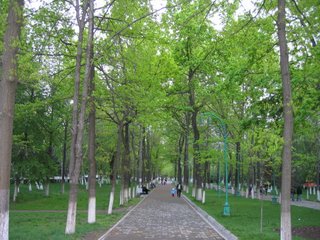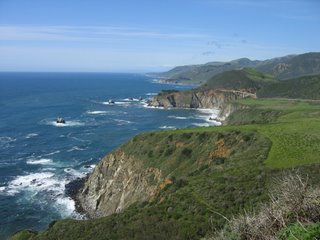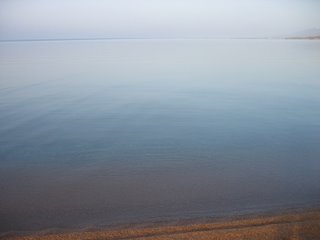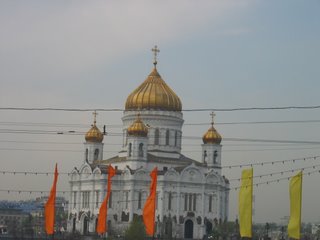
May 13, 2006
A lot has been going on in the past week and I have not found time to write.
I spent three days in Moscow shortly before the May 9th holiday, to celebrate victory in the Great Patriotric War against Germany. Even after 61 years, this holiday is still a really big deal in Russia. News reports estimated that there were 4,000 events held with 5 million people participating.
In Moscow, red, orange and yellow flags decorated all the main streets. At any particular place, I could look around and see at least one or two banners or billboards proclaiming – Happy Victory Day.
We stayed with my friends Mary and Jim, in their apartment just feet from the Red Square. It’s pretty amazing to start finding the red walls of the Kremlin a natural part of one’s daily scenery.
After a search across town for Bolshoi tickets, we ended up finding a pair to an opera for $16. While the Bolshoi is under renovation, the performances are held in an adjoining hall. But the quality was still as top-notch as always. The 3.5 hour performance of The Tsar’s Bride, a story of the bloody intrigues surrounding Ivan the Terrible’s search for a new bride. Since its premier in pre-revolutionary Russia, it had been shown over 1,000 times in the Bolshoi.
When I returned to Kyrgyzstan, I called my friend Zhenya.
“I’m in the hospital. I can’t talk now,” she whispered into her cell phone, then hung up.
I called her son, Algubek, to see what was going on. I worried she was sick.
“Her friend is dying of asthma,” he said, in his straightforward, child-like way. Could people die of asthma? I wondered.
Her friend was a 50-year-old Turkish man. Her former tenant, he became her partner when she opened her new business. He rented half the store, selling groceries, and she rented the other half to sell drugstore-type goods.
When she called me later she told me that he’d asked her to call emergency services. He couldn’t breathe and she assumed it was due to asthma.
“So I called the emergency services for asthma. But the problem was really with his stomach. I should have called the emergency number for stomach problems and we lost time that way.”
She accompanied him to the hospital, where they said he needed an operation and it would cost $500.
“I didn’t know how to find his friends, I didn’t even know his passport number,” she said. “I was running all over the place trying to get the money together. I finally found it and they did the operation. They removed his stomach, just leaving a little piece in there. They showed me his stomach and it just looked horrible. It was completely filled with blood.”
She said they were going to send it off for an analysis for cancer.
“He’s now in a coma. When you called, I was holding his IV. They said if he lives 4-9 days, he might be OK. But it doesn’t look good.” Her voice cracked.
I told her to call me if I could do anything to help. She spent the next few days running out daily to buy blood, trying to contact the Turkish embassy, and being with him. She closed her store.
A few days later she called me. “Thanks for your offer, but there is nothing to be done to help now. I’m on my way back from the Manas airport, where we sent his body back to Turkey.”
She’s having an understandably hard time with his death. When I spoke to her this morning, she was still running around collecting documentation.
“They still haven’t finished the cancer analysis,” she said. “I’m scared that his family will think that we worked together and maybe I had some interest in his dying. I’m afraid they might not believe that he was sick or that he needed the operation. So I want to gather all the medical reports, get them translated and have them sent to the family.”
At the same time, she needs to keep her store going. She was planning to go to the market today to buy notebooks and pens, then going to her store.
“It’s really terrible being at the store – knowing he was always there, that he ate there, that we talked there. I think I’ve lost ten kilograms in the past week.”
It sounds like he probably had stomach ulcers and just didn’t get treatment. So, one more rather young person died rather needlessly in Kyrgyzstan.
The biggest news in Kyrgyzstan this week was the murder of the reputed bandit Rysbek Akmatbaev. I’ve written a bit about him in past entries. He had recently been elected to Parliament, despite several outstanding charges of murder, and was the single person most capable of destabilizing the country. His murder came as a rather welcome shock to locals.
“I think that now our country has a chance for stability,” was the reaction of my coworker, Aizhana.
I heard the following story of events: On Wednesday, Rysbek went to court regarding a charge of murder of a police officer. Apparently, he was charged in three separate murder trials and (probably due to bribery or influence) was acquitted in all three. The family of this murdered police officer appealed the acquittal. Rysbek was in court for the appeal and he was unable to formally assume his seat in Parliament until this was resolved. His main motivation in seeking a Parliamentary seat seemed to be a desire for immunity from his past crimes.
After going to court, he went to a mosque to pray.
“Very nice. He goes to pray after being tried for murder,” I said to the journalist telling me this story.
“Yes, he’s a very good Muslim,” he said, smiling.
Upon coming out of the mosque, he was gunned down by what were probably machine guns. I heard that two bystanders, one 9 and the other 12-years-old were injured. And this journalist suspected that the killers were members of an opposing mob.
After his death, I saw a picture of him for the first time. He wore a black leather baseball hat, had a shadow of a mustache and beard, and his round, brown face wore an almost undetectable smile. He looked like he could have been a pleasant, normal Kyrgyz man. I wondered what factors in his life led him towards the path he chose. And I thought about Malan, our driver in Osh, and how he would have wondered why someone would sacrifice peace of mind and security for the short term pleasures of money and power.
A development that has a similarly large impact on the local population is that the city shut off the hot water for a month. I didn’t hear about this in advance.
I woke up one morning with no hot water. I figured it was just a problem in my apartment and would resolve itself by the next day. It didn’t and I had a cold shower for the second day in a row. By then, it was becoming uncomfortable.
When I mentioned it at work, my local colleagues weren’t surprised.
“No one has hot water,” my 8-month pregnant colleague, Janna, said. “It won’t be turned back on until June 10th. In the meantime, they are doing repairs.”
“That’s why I sent my family back home now,” said Talai, a colleague from Kazakhstan.
I contacted my landlord and it turns out I’m one of the lucky ones. I have a hot water heater that he just needed to turn on. But many people are in for a month of cold surprises in the morning and it’s funny how people band together to help each other.
When I spoke to Zhenya this morning, she just assumed I didn’t have hot water.
“Do you want to come over and take a bath?” she asked. “I have hot water.”
And I make similar offers to others. Tomorrow night a colleague is coming over to take a shower.
